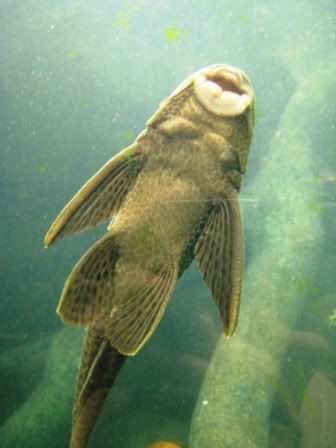The Hippie unfriendly algal biofuels option: Fish squeezing
A new company has come up with a way to bypass the inherent difficulty of algal biofuels: getting the biofuel out of the algae. But first, some background:
Algal biofuels have a lot of potential. Basically, it has a very high yield per acre, it consumes rather than produces CO2 (I have researched it for EnSys because of this), and in the long term could be a great solution to the "energy crises" - if anyone can get it to work. Tests have been going on since the mid 50's, and so far, no gas.

It is, however, impressive technology. Set up a tank, tanks, or pond. Feed it light and CO2 (one free, the other you will be paid to take). After a while, take the algae and break them down to get the oil they have produced out (this part is especially tricky).
The problem is that it never works out. Invasive algae take over from the stuff you want. The little guys die out from not enough this or too much that. And, in the end, it is damn hard to get any fuel actually out of the persistently non-permeable cell walls.
Enter the fish.

The new company's idea is to avoid all that trouble with harvesting by having little fishies swimming around and then, when you are ready to harvest, squishing the fishies. They have eaten tons of biodiesel (or not actually biodiesel, it has to be refined first), and thus it is all concentrated in one place, and so would supposedly be easier to harvest.
Imagine the conversation:
"So, that old Mercedes runs on biodiesel?"
"Yeah, converted it myself"
"You know, it smells different, my friend used to have one, always smelt like fries or chinese food, this kinda smells like fish"
"Yup, I run it on the crushed remains of algae farm raised fish"
Hippie number one runs away, crying, castro hat falling off mid emo-sprint
The other problem, and one that actually interests me more, is the fact that with this option you are not raising one crop, but two. The added challenges, difficulties, and variables make it hard for me to believe that this will be the algal biofuels approach which finally brings the tech out of its 60 year test phase.
Algal biofuels have a lot of potential. Basically, it has a very high yield per acre, it consumes rather than produces CO2 (I have researched it for EnSys because of this), and in the long term could be a great solution to the "energy crises" - if anyone can get it to work. Tests have been going on since the mid 50's, and so far, no gas.

It is, however, impressive technology. Set up a tank, tanks, or pond. Feed it light and CO2 (one free, the other you will be paid to take). After a while, take the algae and break them down to get the oil they have produced out (this part is especially tricky).
The problem is that it never works out. Invasive algae take over from the stuff you want. The little guys die out from not enough this or too much that. And, in the end, it is damn hard to get any fuel actually out of the persistently non-permeable cell walls.
Enter the fish.

The new company's idea is to avoid all that trouble with harvesting by having little fishies swimming around and then, when you are ready to harvest, squishing the fishies. They have eaten tons of biodiesel (or not actually biodiesel, it has to be refined first), and thus it is all concentrated in one place, and so would supposedly be easier to harvest.
Imagine the conversation:
"So, that old Mercedes runs on biodiesel?"
"Yeah, converted it myself"
"You know, it smells different, my friend used to have one, always smelt like fries or chinese food, this kinda smells like fish"
"Yup, I run it on the crushed remains of algae farm raised fish"
Hippie number one runs away, crying, castro hat falling off mid emo-sprint
The other problem, and one that actually interests me more, is the fact that with this option you are not raising one crop, but two. The added challenges, difficulties, and variables make it hard for me to believe that this will be the algal biofuels approach which finally brings the tech out of its 60 year test phase.
Comments
Post a Comment